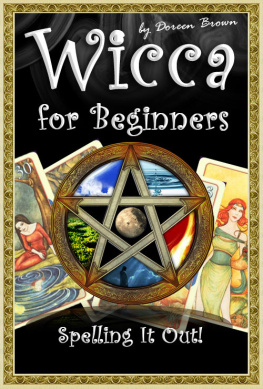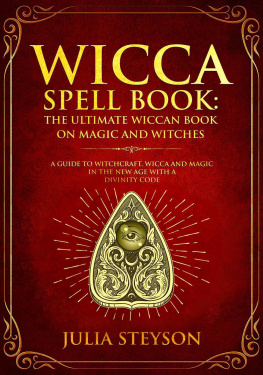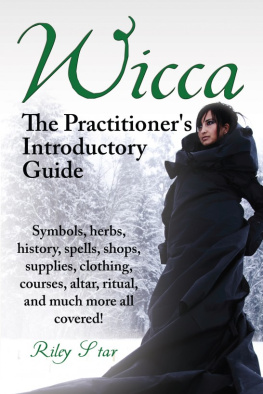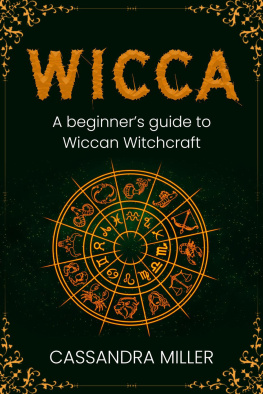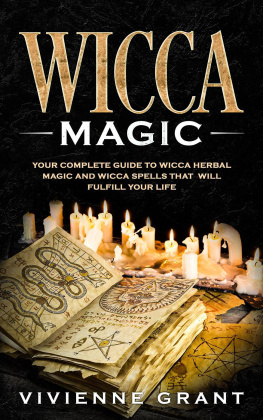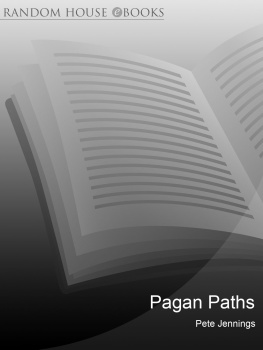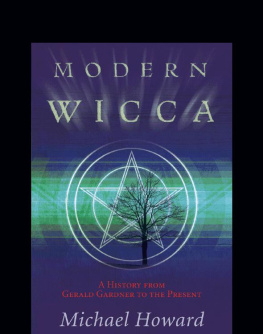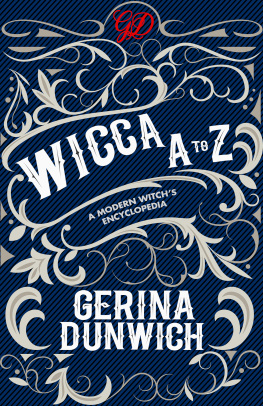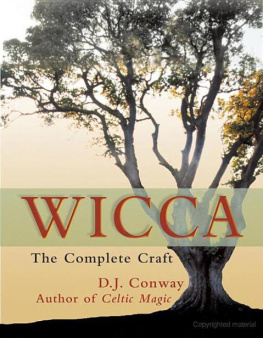Copyright Doreen Brown, 2014
Published by Get Publishing
Smashwords Edition
All rights reserved. Without limiting the rights under copyright reserved above, no part of this publication may be reproduced, stored in or introduced into a retrieval system, or transmitted, in any form or by any means (electronic, mechanical, photocopying, recording or otherwise), without the prior written permission of both the copyright owner and the publisher of this book
Introduction
Wicca as it stands today is a revival and recreation of ancient pagan religious ideas, sometimes known as Pagan Witchcraft, the Witch Cult, The Old Way or just simply as The Craft. First brought to light in the early twentieth century, Wicca started as a series of investigations by prominent thinkers and researchers into modern folklore, and the pre-existing religious traditions that pre-date Christianity, especially within the British Isles.
Its characteristics include an intensely earth-centred outlook (including a reverence for the natural world, nature worship and the observance of seasonal rites), as well as a belief in the higher spiritual realms of the Goddess and the Horned God symbols of our essential nature and the principles of life itself. Pagan Witchcraft attempts to tie us back to our beginnings and our belongings, reminding us of where we come from, to what we owe our existence, and placing us within the natural order (rather than opposed to it as in rationalist traditions). For the Pagan all of life is sacred; an expression of the Goddess and the God. It is for this reason that modern Pagans try to reconnect with nature, be aware of what they eat and how they impact the world, consider all of their habits and actions as part of a sacred journey. To find guidance and to connect with the divine force immanent in life most Pagans conduct Ceremonies, Rites, or Magic(k) in which they attempt to manifest the qualities of the Goddess and the God, and bring balance to the spiritual forces at work in their life.
Through the course of this guide I hope to introduce you to some of the key concepts for the Wiccan practitioner, including some of our history, our beliefs and practices. Whilst this is certainly not an exhaustive study by any means, it will arm you with the beginners' tools necessary to start your own investigations into this nourishing and fulfilling spiritual journey. May your journey be long, and may the Goddess watch over you.
Blessed Be
****
Part 1: The History of the Wicca
1. The Old Ways
There has always been a rich religious tradition in the British Isles, and indeed, throughout the globe. Some of the earliest instances of Cave Art are thought to be religious in application, and burial rites have been discovered that pre-date even this. For untold millennia before the written word ordinary people had a strong and strident spiritual life that referenced the seasons; the natural world; and the forces that are all around us and make up our bodies every moment of our existence.
These pagan traditions formulated themselves through time into religions, and tried to answer the questions that are still of deepest relevance to us today: Who are we? Where do we come from? Why are we here? They offered practical and mystical advice of how to deal with the challenges that we may face, from praying, fasting, beseeching the gods and performing certain duties. They also sought to provide succour to us as we pass through the stages of life; to know what to do when we are young, to when we are starting families, the duties of the parent and the care for the elderly.
Whilst much of what we once knew has been lost because of the lack of written knowledge and the emphasis on the Oral Tradition, many elements of this natural religion persist; in the names of many herbs and plants, in myths and legends, and in architecture and archaeology.
Another reason for the loss of these traditions is the active persecution of the Pagan peoples throughout history by more organised religions. 'Paganism' became associated with 'hedonism' and 'chaos' even with Satanism, when in fact Paganism was itself a highly diverse and sustaining religious style, and nothing to do with the traditional Christian concepts of 'The Devil' or of 'Evil'.
Little bits of this legacy persisted however and we find it hidden in superstition, in the prevalence of mother-figures found throughout ancient architecture (and even used in early churches and temples). Much of our present medicinal knowledge is based upon the discoveries of ancient herbalists, alchemists and natural scientists (consider for example the plants 'Self Heal' and 'Ladies Mantle' whose chemical benefits in the correct preparations are in tune with their names).
For the Wiccan, we try to decipher from these Old Ways the truth and the meaningful, to make use of them in our present situation. The student of the Old Ways is constantly seeking to discover that personal connection to the mysteries of being alive, and uses the old and the new as inspiration and guidance to do this.
2. Modern Wicca
Wicca as it is today is a diverse, ever-evolving and changing discipline. From the early sixties onwards many different traditions began to evolve, including Gardenerian, Alexandrian, Dianic, Cochrane, Cornish, and Faerie. At present Wicca itself sits within a large sea of Neo-Paganist thought, with some movements trending towards Old Norse, others to the Celtic Traditions, Breton, Native American Indian, South American, Haitian, feminist, anarchic and countless others.
It is also worth noting that it is just as common to find a solitary witch as a member of any particular lineage of teaching. These developments have opened up Wicca for any serious student, and who needn't be put off by overt tradition.
Green Wicca
Since the Sixties Wicca has also become tied to a growing 'earth-wise' awareness embodied by the Green, Holistic and New Age Movements. Whereas the original members of the Witchcraft revival where mostly academics who broke the boundaries of their time, now the modern Wiccan is more likely to have a strong personal interest in the Earth, in the Natural World, in self-sufficiency, herbalism, recycling and being environmentally aware.
****
Part 2: Principles of Wicca
1. The Goddess & God
The Triple Goddess
One of the principle beliefs for the Wiccan is the belief in the Great Goddess, most usually in her triple-form of Maiden, Mother, Crone.
The Great Goddess is the Mother Goddess of all ancient peoples, and some variant of her is found throughout the known world, from every indigenous and pre-industrial society. She is at once the Mother of all life, creation, and the nourisher of all beings. In the Wiccan tradition she is especially tied to the natural world and its cycles harking back to ancient Greece and the true Nature Goddesses of Demeter, Gaia, and Persephone. In South America we are made aware of Pacha Mama; the world goddess who gives sustenance to all things that grow on the land. In Ancient Irish myth we hold reverence for Danu, the Mother of all peoples and 'Queen of the Land'.
Her ties with femininity and the lunar cycle are obvious; she is a progenitor deity who births life from the void, as a parent nourishes and provides for it, as a maiden holds beauty, adventure and attraction, and who is able to scold and guide her creations as a crone. These characteristics are found by the Wiccan also in the new, the waxing, full and waning moon and its connection to the woman's menstrual cycle.

